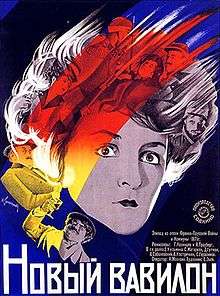The New Babylon
| The New Babylon | |
|---|---|
 | |
| Directed by |
Grigori Kozintsev Leonid Trauberg |
| Written by |
Grigori Kozintsev Leonid Trauberg P. Bliakin (idea) |
| Starring |
Yelena Kuzmina Pyotr Sobolevsky Sergei Gerasimov Vsevolod Pudovkin Oleg Zhakov Yanina Zhejmo |
| Music by | Dmitri Shostakovich |
| Cinematography |
Andrei Moskvin Yevgeny Mikhailov |
Production company | |
Release dates |
|
Running time |
German export edit: 125 minutes[1] (ca. 2,900 m) Gosfilmofond version: 93 min.[1] (ca. 2,170 m) European export edit: 84 min.[1] (ca. 1,900 m)[2] |
| Country | Soviet Union |
| Language | Russian |
The New Babylon (Russian: Новый Вавилон, translit. Novyy Vavilon alt. title: Russian: Штурм неба, translit. Shturm neba) is a 1929 silent historical drama film written and directed by Grigori Kozintsev and Leonid Trauberg. The film deals with the 1871 Paris Commune and the events leading to it, and follows the encounter and tragic fate of two lovers separated by the barricades of the Commune.
Composer Dmitri Shostakovich wrote his first film score for this movie. In the fifth reel of the score he quotes the revolutionary anthem, "La Marseillaise" (representing the Commune), juxtaposed contrapuntally with the famous "Can-can" from Offenbach's Orpheus in the Underworld.[3]
Footage from The New Babylon was included in Guy Debord's feature film The Society of the Spectacle (1973).
Kozintsev and Trauberg found some of their inspiration in Karl Marx's The Civil War in France and The Class Struggle in France, 1848-50.[4]
Synopsis
The film is set in the spring of 1871 during the time of the Paris Commune, in the post-war period of the Franco-Prussian War. A wholesale store in Paris is called "The Bew Babylon" where Louise is employed as a salesperson. She is involved in the Commune, in which Jean, a young man from the countryside with no political affiliations, has to fight as a soldier in the army controlled by the French government. Both are in love with each other, although they are on opposing sides. But their love has no place in the time of political turmoil. At the end of the film, Jean is ordered to dig a tomb for Louise, who was sentenced to death by the court.
Production
The New Babylon was staged with members of the "Factory of the Eccentric Actor" (FEKS) - an avant-garde artists' association founded in 1922 that sought to create new paths in the performing arts. FEKS first began as a theater group, but in the following years, many of its members shaped the Russian-Soviet film history when working as actors, outfitters, and cinematographers. They wanted to get away from the naturalism and empathy aesthetics of bourgeois art and to replace it with Dadaist Constructivism. They were influenced by street art and their cinematic preference was Griffith [5] and Chaplin, [6] not German expressionistic cinema of the early 1920s. [7]
"Yesterday: salons, obeisances, barons. Today: yells of newsboys, scandals, policeman's truncheon, noise, scream, stomping, running," declared Grigori Kosintsev and Leonid Trauberg in their "Manifesto of the Eccentric Actor" [8]
Like Kosintsev and Trauberg, nineteen year old Dmitri Shostakovich was a member of the film group of "FEKS", dedicated to the abolition of the borders between theater, film, circus, music hall and opera.
In his musical score he used various musical forms: dance and operetta melodies as well as French folk music and revolutionary songs: Ça ira, La Carmagnole and the Marseillaise; it served as a leitmotif for the reactionary bourgeoisie and was used in various forms, such as can-can, waltz or gallop.
The score, which bears the Opus number 18, was lost shortly after the premiere, and was only discovered again shortly after Shostakovitch's death in 1975. [9]
The Russian premiere of The New Babylon took place on 18 March 1929 in Leningrad.
References
- 1 2 3 At 20 frames per second.
- ↑ "Im Räderwerk der Filmzensur" (in German). arte. 2006-10-25. Retrieved 2009-04-02.
- ↑ Described and played on BBC Radio 3's CD Review program (14 January 2012)
- ↑ Fitzgerald, Mark (1990) New Babylon: Royal Northern College of Music, 30th June 1990 8.00 pm: programme notes, p. 7
- ↑ so Taylor S. 148.
- ↑ „Chaplin’s bottom is dearer to us than the hand of Eleonora Duse.“ (cited by Lokke Heiss)
- ↑ "arte.tv" (in German).
- ↑ "bibliotekar.ru" (in Russian).
- ↑ Sheet music examples from Bernatchez, p. 263 ff.: Second musical examples, p. 263 1. Old French song from the 6th film part on "Das neue Babylon" (with text) - Tchaikovsky's Old French song from the album for youth, p 2. Excerpt from Gnessin's gallop, "A Jewish orchestra at the mayor's ball" and excerpt from the second part of the film about "The New Babylon".
Bibliography
- Theodore van Houten (1989). Leonid Trauberg and his Films - Always the Unexpected. 's-Hertogenbosch: Art & Research.
- Theodore van Houten (1991). "Eisenstein Was Great Eater - In Memory of Leonid Trauberg. 's-Hertogenbosch: Art & Research.
- Marek Pytel (1999). New Babylon: Trauberg, Kozintsev, Shostakovich. London: Eccentric Press.
- Stephen L. Hanson (2000). "Novyy Vavilon". In Tom & Sara Pendergast (eds.). International Dictionary of Films and Filmmakers. 1: Films (fourth ed.). London etc.: St. James Press. ISBN 978-1-55862-450-4.
- Vincent Canby (October 3, 1983). "'New Babylon,' Silent Russian Classic". The New York Times.
External links
- The New Babylon at the Internet Movie Database
- The New Babylon at AllMovie
- Nina Goslar; et al. (2006-10-25). "Das neue Babylon" (in German). arte. Retrieved 2009-04-02.
- Jacques Poitrat (ed.) (2006). "Новый Вавилон" (PDF) (in French). arte. Retrieved 2009-04-02.